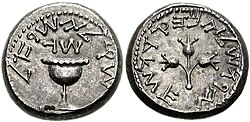Kosher Healing Recipe | Pomegranate Salad With Mint | Song Of Solomon 4:3
Description:
Introduction: The Healing Power of Pomegranates
Pomegranates have long been treasured in Jewish tradition for their beauty, symbolism, and health benefits. In Scripture, they are often associated with blessing, abundance, and spiritual renewal. Beyond their spiritual significance, pomegranates are rich in antioxidants, vitamins, and nutrients that promote physical healing and vitality.
For Messianic Jews, enjoying these sacred fruits is a way to connect with our heritage while nurturing our bodies as temples of the Holy Spirit. Today, we’ll create a simple, refreshing Kosher Pomegranate Salad with Mint—a dish that celebrates both health and faith.
Kosher Pomegranate Salad With Mint
Ingredients:
-
2 cups fresh pomegranate seeds
-
1 cup chopped cucumber
-
1/2 cup fresh mint leaves, chopped
-
1/4 cup crumbled feta cheese (optional, Kosher-certified)
-
2 tablespoons extra virgin olive oil
-
1 tablespoon fresh lemon juice
-
Pinch of kosher salt and black pepper
Instructions:
-
In a large bowl, combine pomegranate seeds, chopped cucumber, and mint leaves.
-
In a small bowl, whisk together olive oil, lemon juice, salt, and pepper.
-
Drizzle the dressing over the salad and toss gently to combine.
-
Sprinkle feta cheese on top, if desired.
-
Serve immediately or chill for 10–15 minutes for a refreshing, cool treat.
Tips:
-
For added texture, mix in a handful of toasted walnuts or almonds.
-
Use this salad as a side dish for Shabbat dinner or a festive holiday meal.
-
Consider serving in a clear glass bowl to showcase the vibrant red pomegranate seeds—symbolizing blessing and life.
Scripture Reflection: Song of Solomon 4:3
"Your cheeks are beautiful with ornaments, your neck with strings of jewels." —Song of Solomon 4:3
This verse reminds us that God delights in our wholeness—body, soul, and spirit. Just as a pomegranate is full of seeds, each representing life and blessing, our lives are meant to be filled with spiritual and physical vitality.
By enjoying foods that nourish and heal, we honor the gift of life God has entrusted to us. Preparing and eating this salad can be a mindful practice, a moment to reflect on His goodness, and a way to bless our bodies as temples of the Creator.
Freebie Call-to-Action
Want more healing recipes and biblical inspiration?
Send Us An Email Right Now To Download My Free, "7 Biblical Healing Foods Guide!"
Explore more Kosher, Messianic Jewish recipes that nourish your body and spirit, inspired by the Torah and the teachings of Yeshua.
Wikipedia Excerpt:
The pomegranate (Punica granatum) is a fruit-bearing, deciduous shrub in the family Lythraceae, subfamily Punicoideae, that grows between 5 and 10 m (16 and 33 ft) tall. Rich in symbolic and mythological associations in many cultures, it is thought to have originated from Afghanistan and Iran before being introduced and exported to other parts of Asia, Africa, and Europe.[4][5][6]
It was introduced into Spanish America in the late 16th century and into California by Spanish settlers in 1769.[7] It is widely cultivated throughout West Asia and the Caucasus region, South Asia, Central Asia, north and tropical Africa, the drier parts of Southeast Asia, and the Mediterranean Basin.[7] The fruit is typically in season in the Northern Hemisphere from September to February, and in the Southern Hemisphere from March to May.[8][9]
The pomegranate and its juice are variously used in baking, cooking, juice blends, garnishes, nonalcoholic drinks, and cocktails.
Ancient Israel and Judaism
Hebrew Bible
Pomegranates are one of the Seven Species (Hebrew: שבעת המינים, Shiv'at Ha-Minim) of fruits and grains enumerated in the Hebrew Bible (Deuteronomy 8:8) as special products of the Land of Israel.[36] The Song of Songs (also known as the Song of Solomon) mentions the pomegranate six times,[88] often as a symbol of beauty and fertility. In one verse, the female lover is described: Your lips are like a crimson thread, and your mouth is lovely. Your cheeks are like halves of a pomegranate behind your veil” (Song of Solomon 4:3).[36]
Some Jewish scholars believe the pomegranate was the forbidden fruit in the Garden of Eden, as described in the Book of Genesis.[89] The Book of Exodus[90] describes the me'il ("robe of the ephod") worn by the Hebrew high priest as having pomegranates embroidered on the hem, alternating with golden bells, which could be heard as the high priest entered and left the Holy of Holies. In the Book of Numbers, pomegranates are listed among the fruits that the scouts brought to Moses to demonstrate the fertility of the "Promised Land".[91][36] According to the Books of Kings,[92] the capitals of the two pillars (Jachin and Boaz) that stood in front of Solomon's Temple in Jerusalem were engraved with pomegranates. Solomon is said to have designed his coronet based on the pomegranate's "crown" (calyx).[85]
Historical and traditional use

The pomegranate appeared on the ancient coins of Judaea, see Hasmonean, Herodian and First Jewish Revolt coinage.

The handles of Torah scrolls, when not in use, are sometimes covered with decorative silver globes similar in shape to pomegranates (Torah rimmonim).[93]

Consuming pomegranates on Rosh Hashana, the Jewish New Year, is traditional because, with its numerous seeds, it symbolizes fruitfulness.[89]



.jpg)


.jpg)
.jpg)



No comments:
Post a Comment